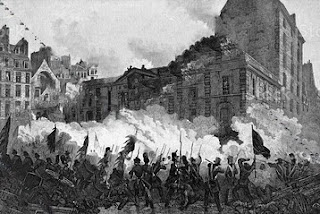-: Riders to the Sea: Poetic Drama :-
Modern verse contains a great deal of poetic material, using 'poetic' in the same special sense. The poetry of exaltation will be always the highest; but when men lose their poetic feeling for ordinary life and can not write poetry of ordinary things, their exalted poetry is likely to lose its strength.
—Sacred Wood, T. S. Eliot
Nowadays poetic dramas, without pleasure, have become insipid, almost academic. The reason is perhaps, a large number of poets hanker for the stage, especially the Romantics who were far removed in an unrealistic world of symbols and myths. Nevertheless, dramatic poetry, in its most intense moments, can convey that which is incommunicable and inexpressible through prose. Although the poetry in Riders to the Sea does not lie in its linguistic expression; Synge, a member of the naturalistic school of poetry, has achieved the poetic intensity by strictly adhering to the local colour "in his words and ... give[s] the reality, which is at the root of all poetry, in a comprehensive and natural form" (Preface of The Playboy of the Western World).
|-------------------------------------------------------------------------------------------------|
| Please check other Questions on Riders to the Sea available in this blog:-
| 1. John Millington Synge's 'Riders to the Sea' as a tragedy| 2. Maurya as a tragic protagonist
|-------------------------------------------------------------------------------------------------|
Like a symphony, Riders to the Sea has brought divergent elements together, creating the atmosphere of a poetic play. The setting here is the craggy landscape of the Aran Islands, exposed to band battered by the sea, the gloomy weather hanging like a pall on the poverty-stricken household. Fused into this setting are the world of Celtic customs, manners, beliefs, superstitions, and the Greek tragedy of fatalism and the calm resignation of its protagonist. In fact, the play is more a poem; for, as Aristotle said, the medium of tragedy should be poetic. Untouched by any comic relief, the thoughts are more comprehensive and concentrated, with its profound grip of reality and superb insight into human character.
 |
| Map Aran Islands |
In fact, for the first time in Modern drama, we have a treatment distinctly romantic in vision and conception as the poetry in the speeches only reflects the poetry of the characters' emotions, rooted in their tragic reality. The language of Cathleen, Nora and Maurya is punctuated by death and torment of brokenness, their lives being under perpetual uncertainty. This poetically tragic syntax, low voiced exclamation and repeated references to the "Young Priest" and "the grace of God" convey their desperation in trying to give as much life to their desperation in trying to their existence as possible:
... let you not be afraid. Herself does be saying prayers half through the night, and the almighty God won't leave her destitute ...It's a speech that has a pagan energy expressed in a Christian idiom— a unique exploitation by Synge that explores the uneasy co-existence between the two traditions in the island. The emphatic tragedy that beckons these people is projected in the statement "as the tide turns", a line that runs like a prophecy throughout the play, suggesting that every action on this island is governed by the tide. Under the desperation of retaining identity, a mother of her son, Maurya enters a Death-in-life existence. In her desperation to "hold back" Bartley, her only surviving son, she unconsciously gives a living entity, about to voyage into his last journey, the mark of the dead:
He's gone now; God spare us, and we'll not see him again. He's gone now, and when the black night is falling, I'll have no son left me in the world.Being under a judgement of death the unadorned simplicity of Bartley conceals probably a greater knowledge of the vitality of life. And hence, while his departing speech— "the blessing of God on you"— signifies a tragic agony, it also speaks of a quiet beauty that anticipates the sea "leaving a track to the door".
I've seen the fearfullest thing any person has seen since the day Bride Dara seen the dead man with the child in his arms.Expression of pathos and dignity is also expressed in:
but in this place it is the young men do be leaving things behind that do be oldThese words underline the futility of its appeal to the struggling lives of the "young men" which reminds us of the poetic lamentation of the classical tragedies. But the uniqueness of this tragedy comes when she stands victorious in preparing herself for an understanding of the principles of mortality:
No men at all can be living forever, and we must be satisfiedAll these enhance the poetic intensity of this play. Images like "pot oven", "spinning wheel" and the "cake", symbolises like boards for the coffin, the rope and myths like black night, rise of sea, pig with black feet and the star up against the moon are used by Synge in the play, suitable only for poetic drama.
Verse as a dramatic medium had not been used as it was in the Elizabethan age. Eliot himself acknowledged the limitations of a poetic prose drama—
... in order to be poetic in prose, ...Synge wrote plays about characters whose originals in life talked poetically... [to] remain real people.Thus in Synge, poetry and drama are inseparable. The poetic use of grammar less language creates a sense of urgency with which the audience progresses towards an irrefutable sense of tragic destiny that hunts all the chimera of life.






No comments
Thanks for your valuable opinion. Your comment inspires us a lot to do better time and again.